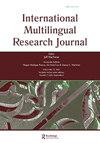Heritage language use in the workplace: 1.5-generation Korean immigrants in New Zealand
IF 2.1
1区 文学
Q2 EDUCATION & EDUCATIONAL RESEARCH
引用次数: 6
Abstract
ABSTRACT Drawing on Bourdieu’s concept of linguistic capital and Darvin and Norton’s notion of investment, this study explores heritage language (HL) use among 1.5-generation Korean immigrants in the New Zealand workplace. The data were collected through interviews with heritage speakers of Korean working in diverse fields in Auckland. The majority of the participants had some degree of regular HL use at work, albeit limited to interactions with monolingual clients rather than with bilingual clients or colleagues. Some participants hesitated to use Korean in these situations because of their self-perceived imperfect HL skills and language anxiety. Moreover, although they perceived their HL as useful, they did not consider it a highly valuable form of linguistic capital in their professional lives. While they realized that HL proficiency would be valuable if they were to return to Korea for career-related purposes, none of them had plans to do so. Consequently, despite a stated interest in improving their HL proficiency, they did not actually invest in the HL. This study sheds light on the complex relationships between language ideologies, identity, and investment in HL learning in the context of diaspora, and offers pedagogical implications for HL education.工作场所的传统语言使用:新西兰1.5代韩国移民
基于布迪厄的语言资本概念和达尔文和诺顿的投资概念,本研究探讨了新西兰职场中1.5代韩国移民对传统语言(HL)的使用。这些数据是通过采访在奥克兰不同领域工作的韩国语传承者收集的。大多数参与者在工作中都有一定程度的定期使用HL,尽管仅限于与单语客户的互动,而不是与双语客户或同事的互动。一些参与者在这些情况下犹豫是否使用韩语,因为他们自我感觉不完美的语言技能和语言焦虑。此外,尽管他们认为自己的语言是有用的,但他们并不认为这是他们职业生涯中非常有价值的语言资本。虽然他们意识到,如果他们回到韩国从事与职业相关的工作,熟练掌握HL将是很有价值的,但他们都没有这样做的计划。因此,尽管他们表示有兴趣提高他们的HL熟练程度,但他们实际上并没有在HL上投资。本研究揭示了散居背景下语言意识形态、身份认同和语言学习投资之间的复杂关系,并为语言教育提供了教学启示。
本文章由计算机程序翻译,如有差异,请以英文原文为准。
求助全文
约1分钟内获得全文
求助全文
来源期刊
CiteScore
4.10
自引率
4.80%
发文量
19
期刊介绍:
The International Multilingual Research Journal (IMRJ) invites scholarly contributions with strong interdisciplinary perspectives to understand and promote bi/multilingualism, bi/multi-literacy, and linguistic democracy. The journal’s focus is on these topics as related to languages other than English as well as dialectal variations of English. It has three thematic emphases: the intersection of language and culture, the dialectics of the local and global, and comparative models within and across contexts. IMRJ is committed to promoting equity, access, and social justice in education, and to offering accessible research and policy analyses to better inform scholars, educators, students, and policy makers. IMRJ is particularly interested in scholarship grounded in interdisciplinary frameworks that offer insights from linguistics, applied linguistics, education, globalization and immigration studies, cultural psychology, linguistic and psychological anthropology, sociolinguistics, literacy studies, post-colonial studies, critical race theory, and critical theory and pedagogy. It seeks theoretical and empirical scholarship with implications for research, policy, and practice. Submissions of research articles based on quantitative, qualitative, and mixed methods are encouraged. The journal includes book reviews and two occasional sections: Perspectives and Research Notes. Perspectives allows for informed debate and exchanges on current issues and hot topics related to bi/multilingualism, bi/multi-literacy, and linguistic democracy from research, practice, and policy perspectives. Research Notes are shorter submissions that provide updates on major research projects and trends in the field.

 求助内容:
求助内容: 应助结果提醒方式:
应助结果提醒方式:


